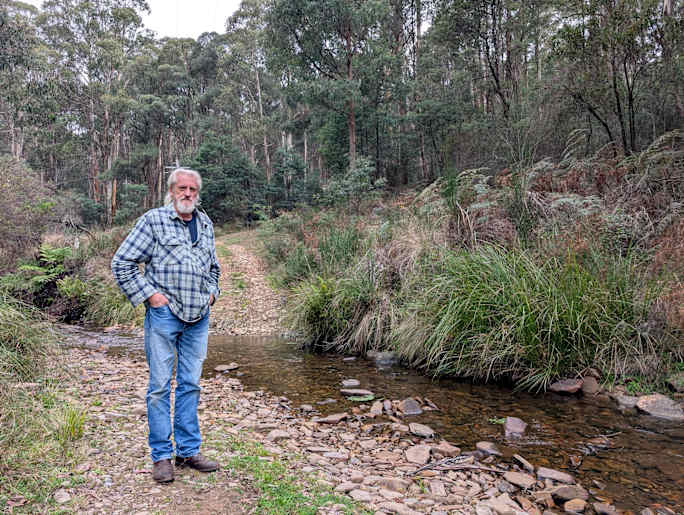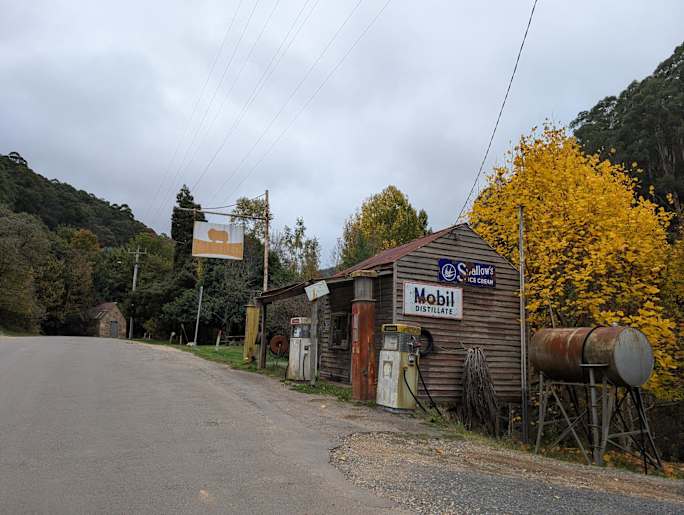WITH the recent closure of the Morning Star, a mining operation located on the spur at the junction between Morning Star Creek and the Goulburn River, the faint echo of Woods Point’s gold rush heyday has grown quieter.
The mine was one of the last remaining links to a time when the remote High Country settlement rivalled Mansfield in population.
Now, just the brick hearths and chimneys remain, scattered among thick bushland.
But Woods Point is not a ghost town.
Locals say to abandon it to unmanaged wilderness would be a disservice to the dozens of permanent residents who still call it home — and to the part-timers who visit for fishing, hunting, hiking or the solitude at the end of a long drive on a notoriously troublesome road.
Latest Stories
Among those residents is Tony Rugys, a former maintenance fitter at the Morning Star and a captain of the Woods Point CFA, who has lived in the area for more than 50 years.
He believes the ongoing drought has temporarily slowed a bigger threat — one that howls in the hills.
“The Goulburn river, just six kilometres from its source, runs across the Mansfield-Woods Point Road from my house," said Mr Rugys.
"And it runs at a trickle.
"I believe that is why the deer haven’t come down from the hills this year.
"And that means that the wild dogs have largely stayed up on the tops with them.
"But before the drought, the situation with wild dogs was as bad as it has been in my five decades in Woods Point.”
Mr Rugys has been living “behind enemy lines” in the tangled bushland of the Great Dividing Range, dealing with wild dogs since the 1980s.
“When I first moved to Woods Point in the eighties, there were a lot of gold dredgers around and a lot of them were scared of walking two or three kilometres through the bush to their dredge with the dogs following them," he said.
"So I used to keep the wild dog population down for them with a trap at the tip.
"I used to get six or seven a year, it might not sound like a lot but if those six dogs per year mate and rear litters, there’s exponentially more dogs out here.
"DEECA used to encourage us to get rid of them, not anymore.”
“I can still walk for kilometres through the bush, even at my age, even with a smashed up hip with titanium parts.
“But if I go for a walk or a ride up the back, nowadays, I carry a 12 inch knife on my hip.
"Their instinct for the hunt, for the kill is so strong that they can sense weakness in people.
"I’m older now and when you're older, they know you've got a weakness.
"If they're hungry and they’re in a pack, they will pull you down.”
According to Mr Rugys, dingoes are not the problem, and there's a distinction between them and the wild dogs.
“The dingoes don’t worry me, I’ve never seen them do anything up here so I leave them alone and they leave me alone," he said.
"But the wild dogs, when you get two to three of them screaming in the dark, I’ll tell you what, it sends a chill down your spine.
"There’s wild dogs just running up and down Mansfield-Woods Point road down here, they’ve had dogs on the street in Woods Point, I’ve seen them.
“I’ve been out stalking a deer along some old sneaking track and wild dogs have been walking in parallel with me through the bush, just snarling and stalking me as I stalk the deer.
"I’ve had dogs here at my house numerous times when I've come back from shopping and stuff like that, they've crossed the river and walked into the driveway thinking the place is empty.
"They tried to attack the neighbour’s dog not too long ago.”
For Mr Rugys, the sounds are often worse than the sightings.
“They howl every night of the full moon, they come screaming past my place chasing deer," he said.
"It's a hideous noise.
"The campers howl back at them when they’re drunk, it antagonises them, and it invites them to come down onto the campsite.
"You should not invite them down into the campsite.
"I have woken up to dogs’ voices out in front of my bedroom window at three in the morning.
"You hear a possum screaming and then you go out in the morning and there’s just torn up fur everywhere.
"They’ll eat anything living in the bush, they’ll eat until they wipe an area out and then they’ll move on.
"I just saw the first wallaby I’ve seen in nearly a year and I haven’t seen a wombat for eighteen months to two years.
"But the deer numbers remain strong, so the dog numbers remain strong.”
Fuel reduction burns are having an effect, but they come with challenges.
“They've done a lot of burns up here and that's going to create a drama for the dogs.
"The DEECA blokes who did the burn offs in German Spur last year, they told me that while they were burning off, all they could hear was the dog's howling in the gullies," he said.
"The dogs weren't real happy.
"A wild dog has to be able to hide in the bush so it can stalk from a distance and sort of slowly creep through, but once an area is burned it's totally exposed and it can’t hunt, so it can’t survive there.”
Mr Rugys is not alone in believing that sensible land management — with hunters, trappers, and locals playing a role — is key to controlling invasive species.
His concerns echo recent statements from Mansfield Shire Mayor Steve Rabie, who has also called for more practical and community-informed approaches to bush management.
But Mr Rugys fears that further restrictions, particularly the proposed expansion of National Parks, will shut locals out.
“I reckon, with the election out of the way, they'll tell us the National Parks are going ahead," he said.
"This town doesn’t survive if it’s surrounded by National Park.
"You won’t be allowed to fish.
"You won’t be allowed to hunt.
"You won’t be allowed to gather firewood.
"And if you can't do these things, all these places will close and everyone associated with them will go away.
"And no one will be managing invasive species.
"And that's when we really lose control of the dogs.”
He is also critical of aerial deer culling, calling it expensive and ineffective compared to experienced ground-based control.
“What you've got now is a lot of no man's land filled with deer and dogs," he said.
"Send in a thousand helicopters and they might shoot three or four if they're lucky because they won't even see them.
"Hunters and trappers can catch six deer a day and they cost an awful lot less than helicopters.
"We can take control of the situation but they have to let us trap and shoot in the areas where it's needed, only in the areas where it's needed.”
Mr Rugys said the Aboriginal people of the High Country used to call the area around Woods Point ‘Devils’ Country’ on account of the snowy weather that made it difficult to inhabit.
While the snow has been absent in recent years, it appears that some devils remain.
















